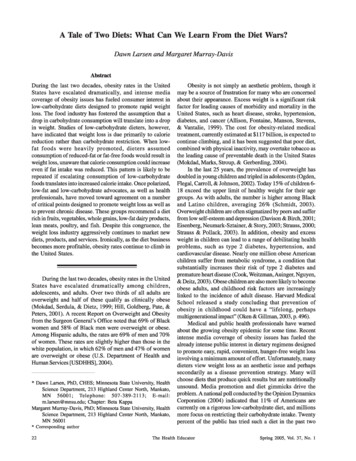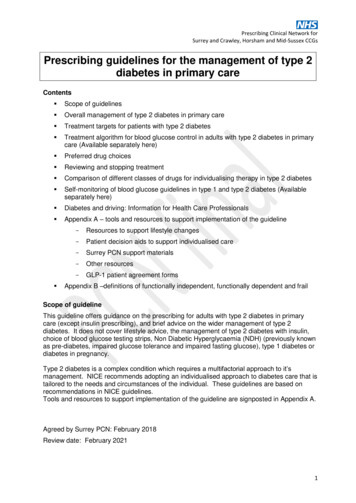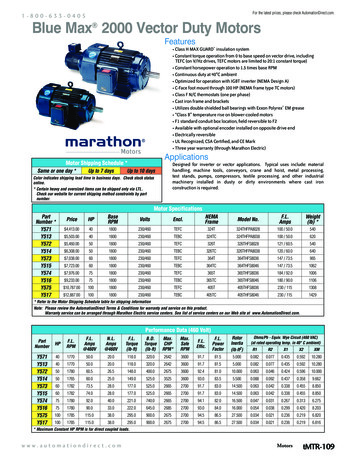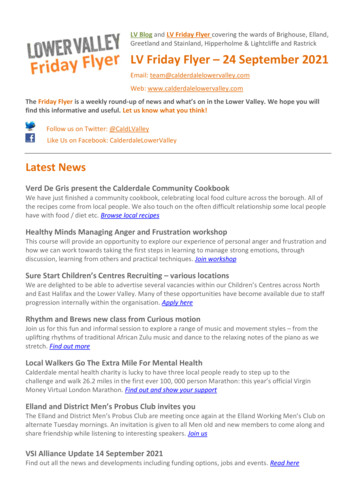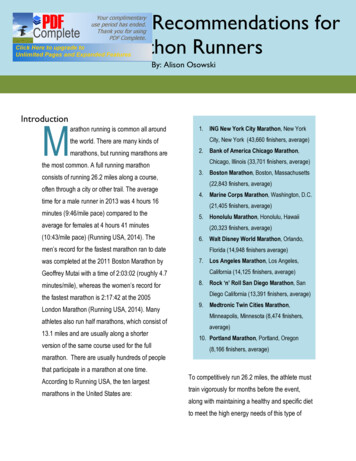
Transcription
Carbohydrate Recommendations forMarathon RunnersBy: Alison OsowskiIntroductionMarathon running is common all aroundthe world. There are many kinds ofmarathons, but running marathons arethe most common. A full running marathonconsists of running 26.2 miles along a course,often through a city or other trail. The averagetime for a male runner in 2013 was 4 hours 16minutes (9:46/mile pace) compared to theaverage for females at 4 hours 41 minutes(10:43/mile pace) (Running USA, 2014). The1. ING New York City Marathon, New YorkCity, New York (43,660 finishers, average)2. Bank of America Chicago Marathon,Chicago, Illinois (33,701 finishers, average)3. Boston Marathon, Boston, Massachusetts(22,843 finishers, average)4. Marine Corps Marathon, Washington, D.C.(21,405 finishers, average)5. Honolulu Marathon, Honolulu, Hawaii(20,323 finishers, average)6. Walt Disney World Marathon, Orlando,men’s record for the fastest marathon ran to dateFlorida (14,948 finishers average)was completed at the 2011 Boston Marathon by7. Los Angeles Marathon, Los Angeles,Geoffrey Mutai with a time of 2:03:02 (roughly 4.7minutes/mile), whereas the women’s record forthe fastest marathon is 2:17:42 at the 2005London Marathon (Running USA, 2014). Manyathletes also run half marathons, which consist of13.1 miles and are usually along a shorterversion of the same course used for the fullCalifornia (14,125 finishers, average)8. Rock ‘n’ Roll San Diego Marathon, SanDiego California (13,391 finishers, average)9. Medtronic Twin Cities Marathon,Minneapolis, Minnesota (8,474 finishers,average)10. Portland Marathon, Portland, Oregon(8,166 finishers, average)marathon. There are usually hundreds of peoplethat participate in a marathon at one time.According to Running USA, the ten largestmarathons in the United States are:To competitively run 26.2 miles, the athlete musttrain vigorously for months before the event,along with maintaining a healthy and specific dietto meet the high energy needs of this type of
athlete. The athlete must practice a well-rounded(2013) conducted a study that showed thatdiet, but carbohydrates are the most crucial partcarbohydrates were the most important nutrientof the athlete’s diet.when training for an endurance event. A maleultra-endurance runner followed generalLiterature ReviewPrevious literature has proven thatcarbohydrates are the most crucial nutrient ofendurance athletes. Runners commonly usecarbohydrate gels and other supplements duringthe event to help replenish carbohydrate levels.Phillips et al. (2012) conducted a study to test theefficiency of these carbohydrate gels. The studytested the effects of these carbohydrate gels onendurance capacity and sprint performance ofteam of 26 athletes. The results of the studyshowed that the consumption of a carbohydrategel before and during an event significantlyimproves the endurance capacity of athletes, buthad little beneficial effect on sprint performance.Stellingwerff (2012) conducted another study thathad shown results similar to this. Three elitemarathon runners were tested and eachparticipant ran two marathons: onesupplementing with plain water throughout theevent and the other supplementing withcarbohydrate containing sports beverage. Theresults of this study show that, in eachparticipant, the race using the carbohydratecontaining sports drink resulted in a shorterfinishing time compared to the racesupplemented with just water. Dempster et al.guidelines for a single bout endurance eventwhich are 10 grams carbohydrates/kg bodymass/day and 1.2-1.6grams protein/kg bodymass/day. The conclusion was that he hadadequate levels of carbohydrates and protein toprovide the daily energy needed and no loss ofbody mass was indicated. One additional studywas conducted by Henson et al (2004) to identifythe influence of carbohydrate consumption andage on lymphocyte function immediately afterfinishing a marathon. Each runner was assignedeither the placebo or the carbohydrate containingbeverage. The results showed that post-racelactate levels were lower in the placebo groupcompared to the carbohydrate group but finishingtimes between the two groups did not differ. Theresults also indicated that the placebo groupshowed lower plasma glucose and insulin levels.Ivy et al. conducted a study whichanalyzed the consumption of a carbohydrateprotein supplement post-exercise on muscleglycogen synthesis rates compared to onlyconsuming carbohydrate containingsupplements. In this study, 7 participants cycledfor 2.5 hours, and each was given acarbohydrate containing supplement. After aperiod of time, the participants cycled again for
2.5 hours and were given one of the followingcarbohydrates. This promotes carbohydratepost-exercise: a protein-carbohydratestoring (2012).supplement or a high-carbohydrate containingOne Day Before the Eventsupplement or a lower-carbohydrate containingsupplement. The results showed that the additionof protein post-exercise increased muscleThe day before the event is the mostcrucial time period to prepare the body for themarathon ahead. The day directly before theglycogen synthesis rates and the supplementsevent is the day where carbohydrate intake iswith the two different levels of carbohydrates didextremely important to prevent the “hitting thenot affect glycogen synthesis rates.wall” sensation that often happens and is theresult of overwhelming fatigue.Before the EventA common and useful preparationOne Week Before the EventCarbohydrates are the most importantnutrient for marathon athletes to consume whenpreparingforamarathon. Becausethe skeletal musclesare fuelled mainly byglucosederivedfrom carbohydrates,strategy is known as carbohydrate loading.Carbohydrateloading is thesupercompensatingofmuscleglycogen storesin preparation for prolonged exercise. Each gramof carbohydrate provides four calories of energyit is important tofor the athlete. According to the Mayo Clinic,adequately build upeffective carbohydrate loading consists of 6-10muscle stores of glycogen to promote a decreasegrams of carbohydrates per kilogram of bodyin fatigue during the race. Figure 1 shows theweight (2012). Carbohydrate loading has notmolecular structure of one molecule of glucose.been associated with an increase in overallIn Stellingwerff’s “Case Study: Nutrition andrunning speed, but instead, with an increasedTraining Periodization in Three Elite Marathonability to maintain running pace throughout theRunners”, it was proven that a diet consisting ofevent (Burke, 2007). Many runners havean increase from 45% to 65% of the caloriesexperienced a sensation commonly known asconsumed“hitting the wall.” This happens when the athleteFigure 1: Glucose moleculedailycamedirectlyfrom
has been exercising for a considerable amount oftime and their muscle glucose levels are depletedcausing the athlete to run out of energy.Carbohydrate loading helps prolong this glucosedepletion leaving the athlete energized for alonger period of time.Male and female athletes mostly benefitfrom carbohydrate loading in similar ways.Previous claims stated that female athletes fail tosuper-compensate muscle glycogen stores this isbelieved to be caused by the smaller amounts ofcarbohydrate and restricted energy intakes offemales. But when females are able to achievean increase in glycogen storage, they see similarBREAKFASTCarbsProteinFatCaloriesBanana27 g1.3 g0.4 g1053/4 cupRolled Oats41 g12g6g2251 Whole wheatbagel52g11g1.5g2602 tablespoonspeanut butter6g8g16 g18812 oz.chocolate milk38 g12 g13 g312Total164grams44grams37grams1,090benefits as males. The menstrual status offemales also effects glycogen storage withgreater storage occurring during the luteal phaserather than the follicular phase (Burke, 2007).The athlete should avoid the consumption of fiberand fats before the marathon because of theissues it may cause with digestion (Moran,Dzledzic, & Cox, 2011).The following is an example of a mealplan that a 150 pound athlete could following forone day of carbohydrate loading before theevent.LUNCH2 cups Pasta¾ cup alfredosauce20 ozGatoradeTotalCarbs130 gProtein25 gFat4gCalories6639g3g30 g33040 g0g0g160178 g28 g34 g1,152DINNER1 potato6 oz rib eyesteak2 slicesgarlic bread20 ozGatoradeTotalCarbs27 gProtein2.5Fat0gCalories115045 g28 g45036 g6g14 g30040 g0g0g160102 g54 g43 g1,024Now, let us prove that this meal plan providesufficient amount of carbohydrates for thisathlete.Kilograms pounds 2.2Kilograms 150 pounds 2.2Kilograms 68.2
oxidation during exercise as compared with asingle carbohydrate source, which means thatcarbohydrate stores are utilized more efficiently.The athlete should also stay adequately hydratedFrom these calculations, it is proven that thisthe hours before the event. Drinking 8 to 16athlete will be provided with enoughounces of water or a sports drink 1-2 hourscarbohydrates to receive the benefits ofbefore the event is beneficial (Dempster, Britton,carbohydrate loading. Because 6.5 grams ofMurray & Costa, 2013).carbohydrates per kilogram is on the lower end ofDuring the Eventthe recommendation, this athlete could consumean even higher level of carbohydrates if theywished.What happens if the runner has Celiac’sDisease and cannot consume gluten? Celiac’sDisease is an autoimmune disorder affectingabsorption from the intestine as villi inflammationand flattening occur. Because gluten is one of themain forms of carbohydrates, other sources mustbe found. Common sources of carbohydrates forthose with this intolerance could include glutenfree whole grain cereal and breads, gluten-freepastas, fruits, brown rice, yogurt, fruit juices, andgluten free granola bars (Black, Skidmore, &Brown, 2012).Morning Before the EventThe morning before the marathon, theathlete must again consume a mixture ofcarbohydrates. A study by Stellingwerff et al.(2013) proved that the consumption of a mixtureof glucose and fructose can result in a20-40% increase in exogenous carbohydrateDuring the marathon, it is crucial toremain hydrated and to prevent glucose levelsfrom sinking too low, known as hypoglycemia.This can be avoided by consuming carbohydratesources during the event. Consumingcarbohydrates will replenish glucose levels in theskeletal muscles which will help prolong theonset of fatigue, causing an improvement ofexercise performance by allowing the runner tomaintain their running pace longer. The positiveeffect of the consumption of carbohydratesduring endurance is proven by a study done byPhillips, et al. who conducted a study on teenathletes. The results of this study supported thatconcept that carbohydrate supplementingimproved endurance capacity but thecarbohydrate supplements did not have an effecton sprint performance (2012). This supports theidea that carbohydrate supplementing duringexercise prolongs fatigue but does not cause theathlete to be faster or decrease finishing times.Stellingwerff (2012) conducted a study on three
marathon runners where the results were verysimilar. Each runner ran two marathons: onesupplemented by plain water and the othersupplemented with a carbohydrate containingsports drink. In each runner, the race that wassupplemented by the sports drink resulted in ashorter finishing time compared to the marathonfueled by plain water.Many options are available for athletes toCarbohydrateCaloriesPowerAde8 oz14 grams50Gatorade8 oz16 grams63Figure 3 compares the common carbohydrate-containingsports drinks and their carbohydrate and caloric levels.Gels and gummies contains anywhereprovide this carbohydrate source during exercise.between 23-28 grams of carbohydrate per ounce.The most common supplements used during theThese are much more energy dense and the usemarathon include sports drinks and energy gelsof gels and gummies may allow the runner toand gummies. Each of these supplements shouldmore easily reach the necessary levels ofbe introduced to the body before the event andcarbohydrate consumption during the event. Gelsshould be used when training so as to let theand gummies should always be consumed with abody adapt and become familiar with the product.small amount of water to allow for fasterThe common sports drink, Gatorade,digestion and absorption. These should never becontains 12 grams of carbohydrates per 8 fluidconsumed in combination with a sports drinkounces. Sports drinks are beneficial becausebecause of the risk of ingesting too much sugarthey provide carbohydrates and help rehydrateat once. Even though these sources have thethe runner, but they are also not as energy-densehighest carbohydrate levels, runners find itas gels and gummies and may be too sweet toharder to stomach solids during the race.consume enough during the race to consume theneeded carbohydrates from it.Figure 2 shows an example of an aid station inthe Chicago Marathon. Gatorade is a verycommon sports drink that is used to supplementrunners during marathons.Energy GelAccel GelCarb-BOOM!E-GelHammer GelHoneystingerPower GelVega SportLava GelGuReloadCalories76767777927463838878Carbs (g)15192019232013212319Figure 4 compares common energy gels and their calorieand carbohydrate levels. The average carbohydrate levels
are 17 grams and the average calorie count is 74 calories.Source: EnergyGelCentral.comprolonged endurance exercise. According toBeelen, Burke, Gibala, and J.C van Loon,The level of carbohydrates neededduring the event depends on the duration of theevent, the intensity of the exercise, and the bodyweight of the athlete. Athletes who perform atintensities that are lower will have lowercarbohydrate oxidation rates and will need lowercarbohydrate intake levels. Figure 3 presents theguidelines of the amount of carbohydrates andtypes of carbohydrates that should be consumedbased on the duration of the exercise.glycogen stores can decline by up to 50-75%during 3 hours of cycling at 70% VO2max. Theconsumption of 1.2 grams of carbohydrates perkilogram of body weight is the ideal amount ofcarbohydrates to consume after an enduranceevent. The consumption of protein at a ratio of1:3 with carbohydrates post exercise increasesthe muscle’s ability to replenish glycogen stores(Ivy et al., 2002) . In other words, theconsumption of small amounts of protein, 0.4grams per kilogram of body weight, incombination with carbohydrates is the ideal postworkout nutrition.Post exercise muscle glycogen synthesisoccurs in two different phases. The first phase ofglycogen synthesis, is independent of circulatinginsulin and lasts about 30-60 minutes after thecompletion of exercise. During this phase,Figure 3 shows the recommended levels ofcarbohydrate intake during an endurance eventdepending on the duration of the exercise.glycogen synthesis rates are high (30-45 mmolper kilogram), but decrease rapidly when noAfter the Eventcarbohydrates are ingested. Studies haveAfter the marathon, the athlete mustshowed that this phase only occurs when postreplenish the muscles and their glycogen storesexercise muscle glycogen levels are reduced tobecause the glycogen levels were extremelyunder 150-220 mmol per kilogram (2010). Thedepleted during the marathon to fuel the body’sconsumption of carbohydrates during this phaseextreme energy needs. Resting muscle glycogenis crucial because the glycogen-synthesis ratesstores range from 500 to 600 mmol/kg bodyare the highest causing the muscle glycogenweight andstores to be replenished more adequately. Thewill decreasegreatlyduringsecond phase is known as the insulin-dependent
phase and has a smaller glycogen synthesis ratethe consumption of small amounts of protein inof 20-35 mmol per kilogram (2010). Glycogencombination with the carbohydrates causes anlevels can be restored during this phase, butincrease in glycogen synthesis. Figure 5 showsmore carbohydrates must be consumed for thethe difference in glycogen synthesis rates whenmuscles to be able to take up as much glycogenconsuming protein-containing supplements andas they would have during the first phasesupplements with different levels ofbecause glycogen synthesis rates are lower.carbohydrates.Post Marathon Meal Example· 12 fluid ounces 2% chocolate milk· 1 medium banana· ½ whole wheat bagel with 2tablespoons of peanut butterTotal grams carbohydrates: 105 g.For a 150 pound person, 105 grams is asufficient level of carbohydrates to replenishmuscle glycogen stores following an te consumption is 82 grams.Kilograms 150 pounds 2.2Kilograms 68.2Carbohydrate grams 68.2kilograms 1.2 gramsCarbohydrate grams 82 gramsFigure 5 compares how the consumption of a protein andcarbohydrate-containing supplement (CHO-PRO), a highcarbohydrate containing supplement (HCHO), and a lowcarbohydrate containing supplement (LCHO) all effectglycogen synthesis per 4 hours. Source: Ivy et al.ConclusionIn conclusion, carbohydrates are themost essential nutrient concerning enduranceexercise. Because carbohydrates are the skeletalmuscles’ main source of fuel, glycogen stores inthe muscles must always be at adequate levelsto provide the athlete with the needed energy toOnce the level of 1.2 grams per kilogram of bodyrun the 26.2 miles of a marathon. Carbohydrateweight is reached, muscle glycogen synthesisloading is a very common practice amongrates will not increase; the time frame in whichendurance athletes to super compensate thethe carbohydrate is consumed affects themuscle glycogen levels and to ensure that theglycogen synthesis rate. Studies have shown thatmuscles have access to adequate amounts
glycogen to finish the race. The process ofrefueling muscles during the race is alsopracticed by runners. The consumption ofcarbohydrate containing energy drinks, gels, andgummies during the race replenish carbohydratelevels and, in turn, providing the muscles withmore glycogen. Most marathons provide aidstations throughout the race to provide therunners with these supplements. After the race, itis crucial that the runner consume 1.2 grams ofcarbohydrates per kilogram of body weight toreplenish muscle glycogen stores. Becauseconsuming a small level of protein along with thecarbohydrates after exercise will increase themuscles’ glycogen synthesis rates, 0.4 grams ofprotein per kilogram of body weight isrecommended combined with the carbohydrates.As mentioned before, carbohydrates are themost important nutrient an endurance athlete,like a marathon runner, can consume.
ReferencesA Step Towards Personalized Sports Nutrition: Carbohydrate Intake During Exercise. (2014). Sports Medicine, 44, S25-S33.Retrieved November 5, 2014, from EbscoHost.Black, K., Skidmore, P., & Brown, R. (2012). Case Study: Nutritional Strategies of a Cyclist With Celiac Disease During anUltraendurance Race. International Journal of Sport Nutrition & Exercise Metabolism, 22, 304-310. RetrievedNovember 5, 2014, from EbscoHost.Burke, L. (2007). Nutrition Strategies for the Marathon. Sports Medicine, 37(4/5), 344-344. Retrieved September 30, 2014,from EbscoHost.Carbohydrate-Loading Diet. (2013, January 23). Retrieved November 5, 2014, from rt-20048518Dempster, S., Britton, R., Murray, A., & Costa, R. (2013). Case Study: Nutrition and Hydration Status During 4,254 km ofRunning Over 78 Consecutive Days. International Journal of Sport Nutrition & Exercise Metabolism, 23(5), 533-539.Retrieved September 29, 2014, from EbscoHost.Energy Gel Comparisons. (n.d.). Retrieved November 9, 2014.Ivy, J., Goforth Jr., H., Damon, B., McCauley, T., Parsons, E., & Price, T. (2002). Early Postexercise Muscle GlycogenRecovery is Enhanced with a Carbohydrate-Protein Supplement. Journal of Applied Physiology,93(4), 1337-1344.Retrieved November 9, 2014, from http://jap.physiology.org/content/93/4/1337Moran, S., Dzledzic, C., & Cox, G. (2011). Feeding Strategies of a Female Athlete During an Ultraendurance RunningEvent. International Journal of Sport Nutrition & Exercise Metabolism, 21, 347-351. Retrieved November 4, 2014,from EbscoHost.Stellingwerff, T. (2012). Case Study: Nutrition and Training Periodization in Three Elite Marathon Runners. InternationalJournal of Sport Nutrition & Exercise Metabolism, 22(5), 392-399. Retrieved September 30, 2014, from EbscoHost.Stellingwerff, T., Godin, J., Tavenard, A., Grathwohl, D., Van Bladeren, P., Kapp, A., . Damak, S. (2013). Effects of PreExercise Sucralose Ingestion on Carbohydrate Oxidation During Exercise. International Journal of Sport Nutrition &Exercise Metabolism, 23(6), 584-589. Retrieved September 30, 2014, from EbscoHost.
Runners”, it was proven that a diet consisting of an increase from 45% to 65% of the calories consumed daily came directly from carbohydrates. This promotes carbohydrate storing (2012). One Day Before the Event The day before the event is the most crucial time period to







